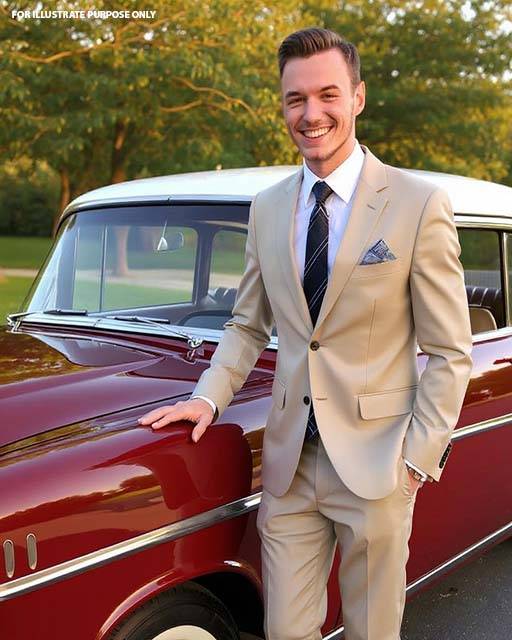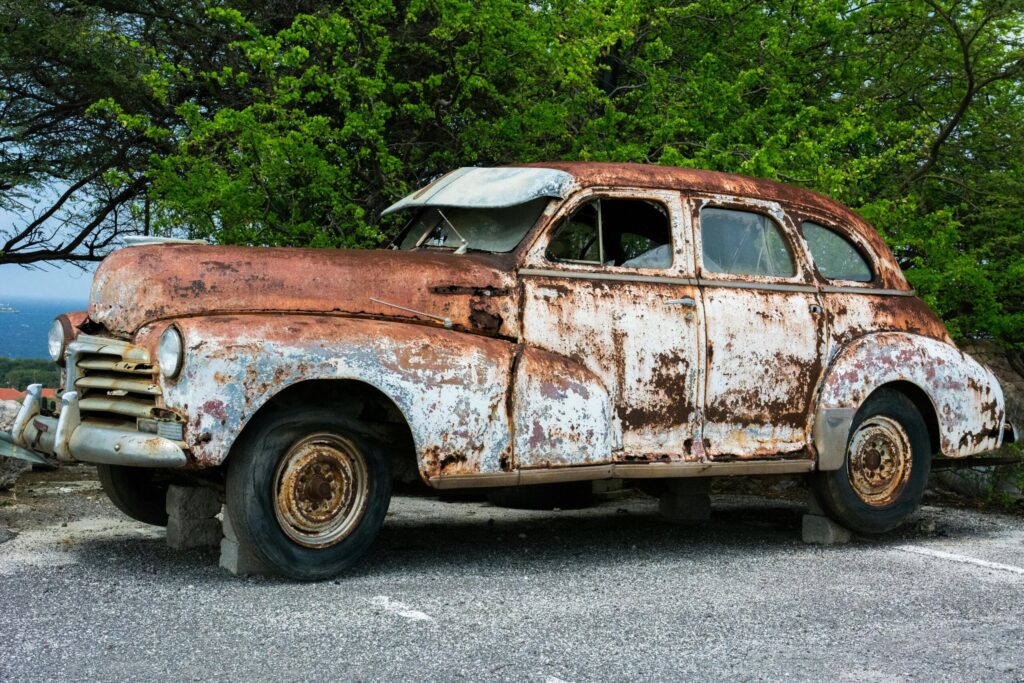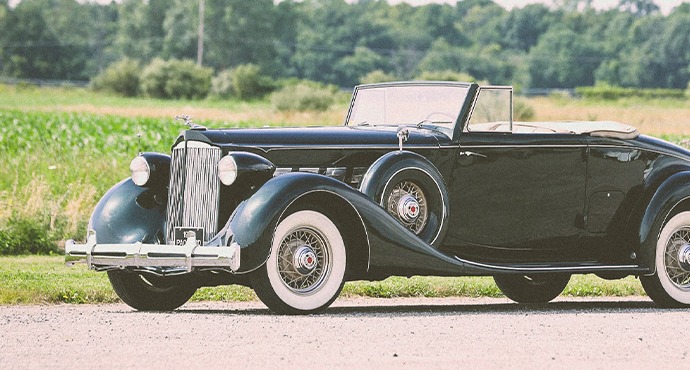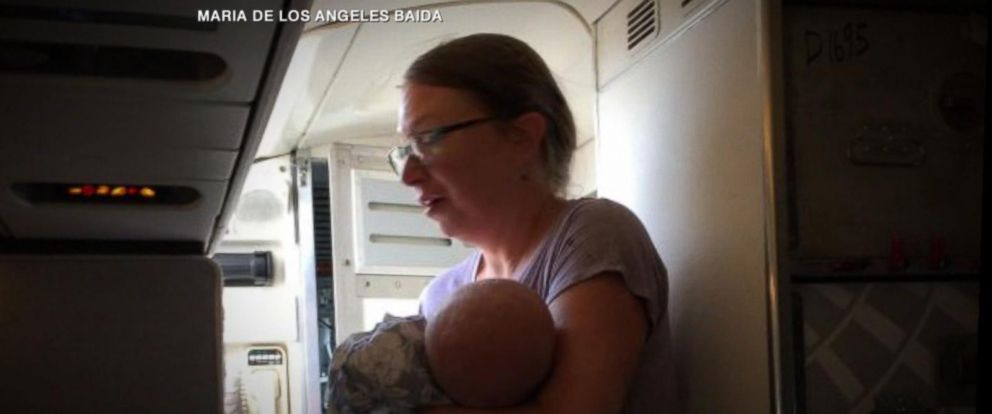I Sold My Grandpa’s Car Because of My Mother — What I Discovered Years Later Left Me in Tears:Even now, at twenty-seven, I can still picture that day as if it were frozen in time. I was seventeen, slamming my backpack on the kitchen chair like I always did, ready to grab a snack before tackling homework. But Mom was sitting at the table, waiting. That was unusual—she usually worked nights, and the house was empty until I went to bed.
The look in her eyes made my stomach drop.
I Sold My Grandpa’s Car Because of My Mother — What I Discovered Years Later Left Me in Tears
“Grandpa Walter passed,” she said softly. “Peacefully, in his sleep. He was eighty-two.”
The world seemed to tilt sideways. Grandpa wasn’t just my grandfather—he was my best friend, my anchor. Every Saturday, without fail, we worked on his pride and joy: a cherry-red 1957 Chevy Bel Air.
It wasn’t just a car. It was ours.
I’d polish the chrome, check the oil, and climb into the passenger seat to dig out butterscotch candies he always left in the ashtray. “Stick to candy, kid,” he’d chuckle, tapping the dash, “don’t pick up my bad habits.” And then we’d take a drive with the windows down, the old V8 rumbling beneath us, as he told me stories about life, about family, about how every man needed something he loved to keep him going.
The day after the funeral, Mom told me something that both lit a spark and crushed me in the same breath.

“He left you the Chevy,” she said, pausing before her voice hardened. “But you’re not old enough to drive. It’ll be sold, and the money will be split evenly.”
I begged her not to. I promised I’d keep it safe. But a week later, I stood in the driveway, heart in my throat, as a stranger pulled away in the Bel Air. Watching the car disappear was like losing Grandpa all over again. That day, I made a silent vow: One day, I’ll get it back. No matter what it takes.
It took ten years. College. Late nights working two jobs. Skipping vacations. Saving every penny I could. Along the way, life moved forward—friends married, careers blossomed—but I carried that vow like a compass. And finally, one late night, scrolling through listings, I found her.
The cherry-red Bel Air. Grandpa’s car.
I tracked it to Michael Bennett, a private collector two states away. When I showed up at his door, I didn’t try to hide my desperation. “This was my grandfather’s. I’ve been looking for it for a decade.”
He studied me for a long moment before nodding. “Cars like this… they’re more than metal. They’re family. Eighty thousand, and she’s yours. I could get more, but it looks like she belongs with you.”
When I finally slid into the driver’s seat, my hands shook against the wheel. The smell was the same—aged leather, faint gasoline, and something sweet, like candy long gone. Driving her home, I felt like Grandpa was right there beside me, whistling to the radio, tapping the dash.
Later that night, parked in my garage, I opened the ashtray out of habit. No candy this time—but an envelope. Yellowed, edges curled, written in Grandpa’s unmistakable handwriting.
“If you’re reading this,” it began, “you found her again. I knew you would. You’ve always been my son. That’s why you get the Chevy.”
Tears blurred the words. But there was more.
“And something else—wrapped here. Find it the way I meant for you to.”
I unfolded the tissue inside and gasped. Resting in my palm was a flawless green gemstone, catching the light like bottled fire. On the back of the envelope, Grandpa had scrawled a final note:
“I knew you’d find the candy.”
It wasn’t just a car he’d left me. It was a lifetime of love, a secret legacy, and proof that he’d always believed in me.
The Bel Air’s engine ticked as it cooled, and I sat there in silence, clutching the stone. My promise had been fulfilled—but more importantly, Grandpa’s faith in me had never wavered.
What he gave me wasn’t just a car. It was truth. It was love. And it was one last gift that no one could ever take away.
The day Grandpa Walter died, the world lost its color.
I was seventeen—half boy, half man—coming home from school when Mom called me and my sisters into the living room. That alone was strange. Mom worked nights, and when she was home, she was usually too tired to talk.
Her face told me everything before she even spoke.
“He’s gone,” she whispered.
I didn’t need to ask who.
Grandpa Walter was eighty-two—still full of energy, still fixing things that didn’t need fixing, still cracking jokes about “being too stubborn to die.” To most people, he was just a quiet old man with a passion for vintage cars. But to me, he was everything.
Every Saturday, without fail, I’d walk the two miles to his house. Rain or shine, he’d be there in the garage—grease on his hands, radio humming old rock tunes, and that familiar smell of oil and peppermint in the air. His pride and joy sat under a canvas cover: a red 1957 Chevrolet Bel Air.
He didn’t have money like the collectors you’d see in magazines, but to him, that car wasn’t about prestige. It was about love, legacy, and patience.
He had this silly habit: every week, he’d hide chocolates in the ashtray. “Candy’s for smart folks,” he’d say with a wink. “Cigarettes are for fools.”
I’d fish one out, pop it into my mouth, and we’d get to work—tightening bolts, polishing chrome, replacing parts we could barely afford.
My sisters never joined. They hated the smell of grease and the dirt under their nails. But Grandpa and I—we were a team.
When Mom told us he was gone, I shut down. The house felt hollow without the sound of his laughter. That night, I couldn’t sleep. I kept replaying our last Saturday together—how he’d patted the hood of the Bel Air and said, “She’ll tell you her secrets someday, kiddo.”
The next morning, I came downstairs hoping for some comfort, maybe a sign. Instead, Mom hit me with a hammer blow.
“Your grandfather left you the car,” she said flatly, not even looking at me.
For a heartbeat, I couldn’t breathe. He’d always said it would go to someone who truly loved it. I never thought that someone would actually be me.
But Mom’s voice cut through the moment like glass.
“Don’t get too happy,” she said. “You’re not even old enough to drive. We’re selling it. The money will be split equally among everyone.”
I begged. I pleaded. I even offered to work off its value. She didn’t listen.
A week later, I stood at my bedroom window as a tow truck carried the Bel Air away. The chrome caught the sunlight—blinding, beautiful, heartbreaking.
That moment burned something into me. A promise.
One day, I’d get her back.
The years that followed weren’t kind. Mom treated me like the enemy, and my sisters never let me forget how “unfair” it was that Grandpa had chosen me. But I let their words fuel me instead of break me.
I worked my way through school, got my degree in mechanical engineering, and by twenty-seven, I was a lead designer at a major automotive firm. My hands still remembered the feel of wrenches, the smell of old oil, the sound of a finely tuned engine.
And I never forgot that promise.
I started searching. Classic car registries, auction records, collector forums—anything that could lead me to Grandpa’s Bel Air. It took almost a year before I found it. The car had been sold to a well-known collector named Michael Bennett, just two towns away.
I called him and told him my story. There was a long silence on the line before he finally said, “Come see it.”
When I pulled into his driveway, my heart nearly burst.
There she was. The same red paint, the same whitewall tires, gleaming under the afternoon sun. She was perfect—better than I remembered.
Michael smiled softly. “She’s a beauty, isn’t she? I’ve had a lot of offers. But something tells me this car means more to you than it ever could to anyone else.”
He named a price—$80,000.
I didn’t hesitate. I signed the check, and when he placed the keys in my hand, it felt like a piece of my soul was coming home.
I drove her slowly, listening to the hum of the engine, feeling every vibration through the steering wheel. The ghost of Grandpa’s laughter seemed to echo through the cabin.
When I got home, I parked in the driveway, turned off the engine, and just sat there. That’s when I remembered the chocolates.
I smiled and reached for the ashtray. Empty. Of course. But as I closed it, I noticed something—an uneven edge behind the tray. Something hidden.
Curiosity took over. I pried it open gently, and a small yellowed envelope slid out. My name—Graham—was written across the front in Grandpa’s unmistakable handwriting.
My hands shook as I opened it. Inside was a folded letter and a small bundle wrapped in tissue paper.
The letter read:
Hi, Graham,
If you’re reading this, it means you brought her home. I always knew you would.
This car was never about the metal—it was about faith. About love.
Your mother and sisters won’t understand, and that’s okay. They never saw what I saw in you.
There’s something I never told anyone. Your mother wasn’t my biological daughter. But you, my boy—you were my son in every way that mattered.
So I left you more than a car. I left you a piece of me.
Look inside the tissue.
Tears blurred my vision as I unfolded the tissue. Nestled inside was a large, gleaming green gemstone—deep and flawless, catching the light like bottled fire.

On the back of the envelope, in his looping script, were six words:
“I had no doubt you’d find the candy.”
I laughed through the tears.
That night, I sat in the driver’s seat, the letter on my lap, the gemstone in my hand. The old radio crackled to life, playing one of his favorite songs—an old Elvis tune.
I realized then that Grandpa hadn’t just left me a car.
He’d left me a story.
A truth.
A love that outlived even him.

And as the Bel Air’s headlights cut through the night, I whispered,
“Thanks, Grandpa. I found the candy.”




